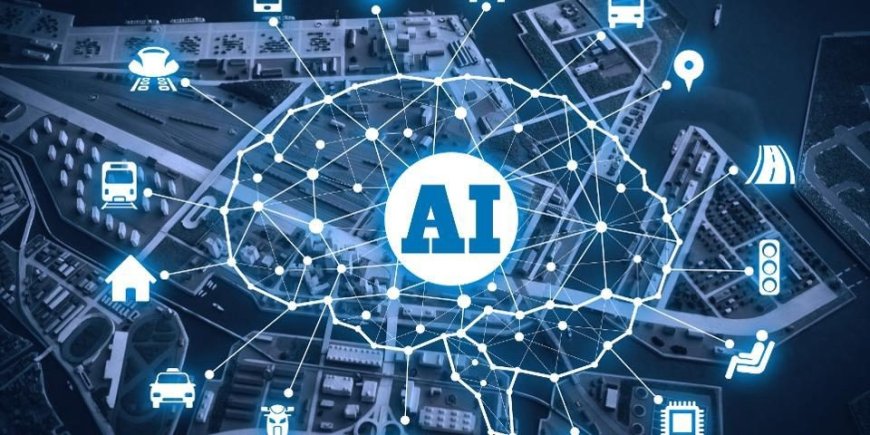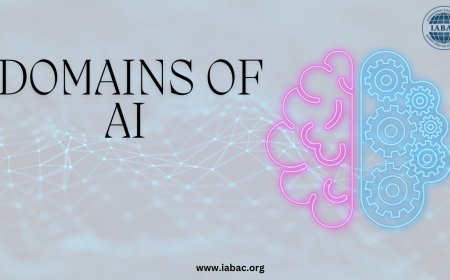The Practical Applications of Artificial Intelligence
Explore practical applications of artificial intelligence (AI) in diverse fields such as healthcare, finance, and transportation.

Technological Artificial Intelligence (AI) has become a widespread term, sparking curiosity and conversations across various industries. The utilization of AI is not just a buzzword; it's a transformative force that is reshaping the way we live and work.
What is Artificial Intelligence
Artificial Intelligence (AI) refers to the simulation of human intelligence in machines that are programmed to think and learn like humans. It encompasses a broad range of technologies and techniques that enable machines to analyze data, recognize patterns, solve problems, and make decisions. The goal of AI is to develop systems that can perform tasks that typically require human intelligence, such as visual perception, speech recognition, language translation, and decision-making.
There are two primary types of AI: narrow or weak AI and general or strong AI. Narrow AI is designed and trained for a specific task, such as virtual personal assistants like Siri or recommendation algorithms on streaming platforms. In contrast, general AI would have the ability to understand, learn, and apply intelligence across a wide range of tasks, essentially emulating human cognitive abilities. As of now, we have achieved significant progress in narrow AI, while the development of general AI remains a complex and ongoing challenge.
AI encompasses various subfields, including machine learning, natural language processing, computer vision, and robotics. Machine learning is a crucial aspect of AI, involving the use of algorithms that allow systems to improve their performance on a task through learning from data, without being explicitly programmed.
Why does AI matter?
Artificial Intelligence (AI) matters profoundly due to its transformative impact on various aspects of our lives, industries, and the global economy. The significance of AI can be understood through several key dimensions:
Efficiency and Automation
AI introduces unprecedented levels of efficiency and automation across industries. Tasks that were once time-consuming and labor-intensive can now be automated, freeing up human resources to focus on more strategic, creative, and complex aspects of their work. This efficiency not only accelerates processes but also reduces operational costs.
Data Analysis and Insights
The ability of AI to process and analyze vast amounts of data is unparalleled. AI algorithms excel at identifying patterns, trends, and insights that might elude human analysts. This capability is invaluable for businesses seeking to make data-driven decisions, refine strategies, and gain a competitive edge.
Personalization and User Experience
AI plays a pivotal role in enhancing user experiences by providing personalized recommendations, content, and services. From recommendation algorithms on streaming platforms to virtual assistants understanding user preferences, AI tailors interactions to individual needs, making technology more user-friendly and aligned with user expectations.
Innovation and Problem-Solving
AI contributes to innovation by pushing the boundaries of what machines can achieve. It facilitates problem-solving through advanced algorithms, simulations, and predictive analytics. In fields such as healthcare, finance, and scientific research, AI is instrumental in accelerating discoveries and finding solutions to complex challenges.
Real-Time Decision-Making
The speed at which AI processes data enables real-time decision-making. In scenarios where quick responses are critical, such as financial trading or cybersecurity, AI ensures that decisions are made at the pace demanded by today's fast-paced, interconnected world.
Improved Efficiency in Healthcare
In healthcare, AI is making significant strides. From diagnostic tools that can analyze medical images to predictive analytics that aid in identifying potential health risks, AI is revolutionizing patient care. It enhances the accuracy and efficiency of medical diagnosis and treatment plans.
Addressing Global Challenges
AI has the potential to address some of the world's most pressing challenges, including climate change, poverty, and healthcare access. By analyzing large datasets and simulating complex scenarios, AI can contribute to informed decision-making and the development of sustainable solutions.
Why is artificial intelligence used?
Artificial Intelligence (AI) finds its prominence in its capacity to efficiently handle extensive data, decipher intricate patterns, and rapidly derive insights—a feat often beyond the reach of human capabilities. This capability to process data at an unprecedented speed forms the core rationale behind AI's broad acceptance across diverse domains. Whether it's streamlining data analysis, automating repetitive tasks, predicting trends, or personalizing user experiences, AI stands out for its practical contributions. By focusing on tangible applications without resorting to exaggerated language, we gain a clearer understanding of how AI addresses real-world challenges, offering solutions that enhance efficiency, decision-making, and innovation across industries.
The benefits of AI
Data Processing and Analysis
Artificial intelligence excels in processing and analyzing vast datasets. In fields like finance, healthcare, and marketing, where massive amounts of data are generated daily, AI algorithms can quickly identify patterns, trends, and anomalies. This capability not only saves time but also enhances the accuracy of decision-making processes.
Automation and Efficiency
One of the primary reasons for the adoption of AI is its capacity for automation. In industries such as manufacturing, logistics, and customer service, repetitive tasks that were once time-consuming for humans can now be efficiently handled by AI systems. This not only increases efficiency but also allows human workers to focus on more complex and creative aspects of their jobs.
Predictive Analytics
AI's ability to predict future trends based on historical data is a game-changer in fields like finance, retail, and supply chain management. Predictive analytics powered by AI enables businesses to anticipate market trends, customer behavior, and potential risks. This foresight is invaluable in making informed decisions that contribute to long-term success.
Personalization
In e-commerce, entertainment, and social media, AI is leveraged to provide personalized experiences. Recommendation algorithms use AI to analyze user preferences and behavior, delivering tailored content, products, or services. This not only enhances user satisfaction but also contributes to increased engagement and loyalty.
Healthcare Advancements
AI is making significant contributions to the healthcare industry. From diagnostic tools that can analyze medical images with high accuracy to personalized treatment plans based on genetic data, AI is revolutionizing patient care. The speed and precision with which AI processes medical information have the potential to save lives and improve overall health outcomes.
Natural Language Processing (NLP)
Communication between humans and machines has evolved with the integration of NLP into AI systems. Chatbots, language translation services, and voice assistants are examples of how AI is enhancing human-computer interaction. This technology is particularly valuable in customer support, making services more accessible and responsive.
The future of AI
Present Scenario: Salaries and Demand
-
Competitive Salaries: The current AI landscape witnesses a surge in demand for skilled professionals, leading to competitive salaries in the field. AI specialists, machine learning engineers, and data scientists are among the most sought-after roles, commanding top-tier compensation packages.
-
Rising Demand: As organizations increasingly harness AI for diverse applications, the demand for skilled AI professionals continues to outpace the available talent pool. This competition for skilled individuals is driving up remuneration across the industry.
Growing Workforce
-
Expanding Talent Pool: The number of professionals entering the AI domain is steadily increasing. Educational programs, certifications, and dedicated AI courses are empowering individuals from diverse backgrounds to acquire the skills needed to contribute to the field.
-
Interdisciplinary Involvement: AI is not limited to computer science; professionals from various disciplines, including biology, psychology, and economics, are integrating AI into their work. This interdisciplinary approach broadens the scope of AI applications.
Technological Advancements
-
Continued Innovation: AI's future is intricately tied to ongoing technological advancements. Quantum computing, enhanced neural networks, and improved natural language processing are among the frontiers driving AI innovation. These breakthroughs are poised to redefine the capabilities and applications of AI.
-
Ethical Considerations: With the increasing influence of AI, ethical considerations surrounding bias, transparency, and accountability are gaining prominence. The future of AI involves Getting Around these ethical dimensions to ensure responsible development and deployment.
AI in Industries
-
Widespread Integration: AI's influence is extending across industries, from healthcare and finance to manufacturing and entertainment. In the future, we can anticipate even deeper integration, with AI becoming a core component of business strategies, innovation, and problem-solving.
-
AI-Powered Automation: Automation through AI will continue to evolve, impacting traditional job roles. However, this transformation will also create new opportunities, emphasizing the importance of upskilling and adaptability in the evolving job market.
Global Collaboration and Competition
-
International Collaboration: AI research and development are increasingly collaborative and global. Institutions, companies, and governments around the world are pooling resources to advance AI capabilities, fostering an environment of shared knowledge and expertise.
-
Competitive Edge: Nations are recognizing the strategic importance of AI in maintaining a competitive edge. The race for AI dominance is a global phenomenon, with countries investing heavily in AI research, infrastructure, and talent development to position themselves as leaders in the field.
The utilization of artificial intelligence is driven by practical needs and challenges faced across various industries. Its ability to process vast amounts of data, automate tasks, provide predictive insights, enable personalization, advance healthcare, and enhance communication makes AI an invaluable tool in the modern world. As we continue to explore and refine the applications of AI, it is essential to appreciate its role in addressing real-world problems and driving positive change. The journey of artificial intelligence is not just about technological advancements; it's about creating a future where humans and machines collaborate to achieve unprecedented feats.











































